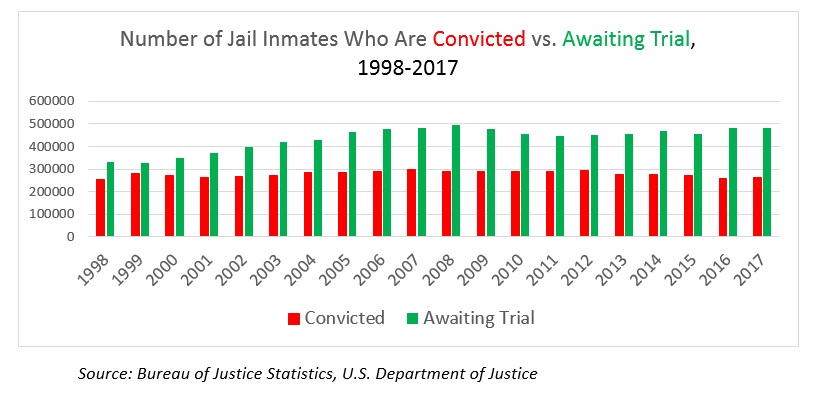The Democratic slogan on crime should be “Unburden the police,” specifically: fund community-based violence interruption programs; fund first-response mental health programs; eliminate traffic stops. With those things off their plates cops can focus on crime-solving/case clearance.
We shouldn’t minimize the reasons communities have for hating and fearing police practices, but we also can’t minimize the reasons those same communities have for wanting protection from crime. So reform the practices: spend less person-power on routine interference with citizens (whether pedestrian stop & frisk or traffic stop & harass) and more on solving crimes (which will be easier when people don’t suffer constant adversarial or humiliating or even fatal interactions with cops). And turn violence interruption over to community groups trained in its successful practice (like those that provided Chicago with a fairly peaceful Memorial Day weekend) and mental health crises over to professionals trained to handle those encounters.
And then use the right rhetoric! “Unburden the police” means exactly the same thing as “defund the police” but sounds pro- instead of anti-cop, anti- instead of pro-crime. “Fight crime smarter not harder.” “Build policing back better.”
Let’s stop leading with our chins on an issue where we have the right answers and our “Blue Lives Matter” opponents have nothing to offer.
Category: Crime & Incarceration
How Jails Stay Full, Always
Governmental organizations have interests, and that includes the jail and court system. They work together to keep jails full no matter whether crime is rising or falling. It’s not that hard: If you hold more people pre-trial and hold all inmates for longer periods, you can keep at capacity in a way that the hotel industry would envy.
But it’s wrong. My analysis in Washington Post today.

Read it here before it happens (Khashoggi)
Mohammed Bin Salman: We are shocked—shocked! that a rogue band of operatives misunderstood my idle reflection (“will no one rid me of this turbulent journalist?”) and committed this terrible crime. We are not surprised that the group included Qataris and Persians. All will be beheaded publicly tomorrow afternoon at 3 and their bodies put through a brush chipper and into my shark pond.
[Twelve schlimazel expat laborers are rounded up off the street and executed]
Trump: As I expected, the vengeful Democrat fake news press mob—the greatest, most mendacious, most treasonous mob any president has ever faced-was wrong again, and if some patriots should exercise my rally advice on them it’s really their own fault. I talked to my good friend Mohammed Bin Salman this morning; he bought three condos right there on the phone, and he firmly denies he had anything to do with this unfortunate event, just like Putin, Brett, and, um me, and that should be enough once and for all.
I might add that the people who expect some of my strongest supporters (and funders) to give up $10 billion in arms business, while there are still working hospitals in Yemen patching up Houthi children to grow up into radical Islamic terrorists, over one foreign brown fake news scribbler for the failing Washington Post, are the kind of people who don’t want America to be great, and that’s why we need to save the Republican congress next month.
Fear of Crime and Information Theory
An appropriate lead-in to this post is the quote attributed to Stalin: “A single death is a tragedy; a million deaths is a statistic.” This fits very nicely into the structure of information theory, as formulated by Claude Shannon sixty years ago. His measure of information is equivalent to the reciprocal of the probability of occurrence of an event (specifically, the logarithm of this number). That is, if the probability of an occurrence is 100% (1.0), that is, if it’s certain to occur, then its information content is the logarithm[1] of 1, or 0; if the probability is 10%, its information content is 1; if its probability is .001, its information content is 3. In other words, the less likely the event is to occur, the higher the information content of its occurrence. That’s why it’s also called a measure of “surprise,” because the occurrence of a highly unlikely event is more surprising than one that is highly likely to occur.
What, pray tell, does this have to do with fear of crime? A lot, it turns out. As Steven Pinker has shown, violence and violent death has declined markedly over the past few centuries, and we are much, much less likely than our ancestors to die at the hands of others, either through wars or by crimes of violence. But this very fact means that (per the quote at the top of this post) each violent death nowadays has a greater surprise value than it did in the past. And that greater surprise value translates directly into greater fear – fear that oneself or one’s family is going to be harmed by others.
So we have this paradox: the safer we make ourselves, the more fear we have – of the unknown, of “them” (any outsider), of MS-13, of the person walking toward you (“Quick, get out your gun before he gets his out”). And of course, it is all so easy to stir up fear in a population, especially when those in power, whom we expect to be responsible adults, are the ones stirring it up.
‘Nuff said.
[1] To make it easy to follow, I’m using logs to the base 10. For those who slept through math class, the logarithm of a number goes up much more slowly than the number itself, so in the examples above the log of 1 is 0, of 10 (the reciprocal of 1/10) is 1, and of 1000 is 3. End of lesson.
Donald Trump, MS13 operative
Donald Trump talks about MS-13 more than any other NGO (no, I haven’t got actual numbers to support this), and it’s not surprising. He loves American exports, and MS13 was made in USA prisons and delivered to El Salvador; its cruelty and misogyny is surely a level of aspiration for him. So it’s not surprising that he and his catspaw Sessions have signed on as actual MS13 operatives, now delivering escaping victims back to them (and all the other Central American gangs) for rape, enslavement, and murder. Even when they’re in court trying to get asylum.
I wonder if he has a deal for docile immigrant employees in his hotels…
How to Have Less Crime and Less Punishment
This is the talk I gave at NYU’s Hoffinger Colloquium this spring.
Everything I’ve learned about crime over 40 years, in 60 minutes.
It’s a mix of theoretical principles and practical suggestions.
“We massively over-punish
and haven’t gotten much in the way of results.
That doesn’t prove that punishment doesn’t work.
It just means we’re doing it wrong.”
Talk starts about 4 minutes in.
Arbeit Macht Frei
The Casa Padre internment camp for child migrants.
A photo in a handout given by the management of the Casa Padre detention centre in Brownsville, Texas, to MSNBC reporter Jacob Soboroff. The centre houses child migrants separated from their parents by officials acting in the name of the United States. Twitter source.

It reminds you of something else, doesn’t it.

Unfair? Soboroff saw no evidence of abuse by the Casa Padre staff - beyond the inherent cruelty of separation. The analogy is the sickening bad faith and institutionalised in-your-face lying to cover up horrific policies. Oh, and mass incarceration outside the rule of law.
Footnote: I deliberately took Sachsenhausen not the better-known Auschwitz gate. Konzentrazionslager - KZ - was a broad Nazi term for a variety of civilian camps, including pure extermination camps like Treblinka, slave labour camps like Sachsenhausen, political prisons like Dachau and Flossenburg, and of course Auschwitz, an unusual combination of an extermination and labour camp, giving rise to the infamous selections. The slogan was common but not universal; it was up to the camp commandant.
The smoking gun and the scarlet letter
The emerging case against Trump for simple bribery.
To review. Donald Trump is manifestly unfit to serve as President of the United States, by either mental capacity or moral character. The procedure for removing an unfit President is basically by way of impeachment. I’ve covered removal for mental incapacity by the 25th Amendment before, and maintain my view that it may still come into play as a shortcut, but let’s follow the CW that it’s down to impeachment. I will also follow constitutional lawyer Stephen Griffin’s argument that contrary to the intentions of the authors of the US Constitution, who saw impeachment as an essentially political safeguard, conviction now requires proof of an indictable offence - though I would add that nothing stops the Congress from taking wider aspects into consideration. Griffin’s reasoning is even more convincing in the near-certain political environment for Trump’s impeachment: that is, a Democratic majority in the House after November, but either a continued narrow Republican majority in the Senate, or a large blocking minority. (If the GOP holds the House, it won’t arise at all.) It will take a knockdown case to secure conviction.
So far, the possible charges have been:
1. Collusion with agents of the Russian government to manipulate the Presidential election in 2016.
2. Obstruction of justice by interference in the investigation of 1.
The second is a matter of public record: Trump admitted on TV that he fired James Comey as Director of the FBI because of the Russia investigation. The trouble here is that lying to police officers investigating you as a suspect is widely seen as fair self-defence, a technical crime like speeding on an empty rural road. The counterargument is that higher standards apply to the head of the executive, including federal law enforcement, who has sworn an oath to uphold and enforce all the laws. This is not likely to sway Trump’s core supporters, who are also now also the core supporters of Congressional Republicans.
The former is overwhelmingly likely from the Steele dossier, numerous credible press accounts of funding flows and meetings involving Trump’s inner circle and Russians close to the Kremlin, the charges against and convictions of Papadopoulos, Flynn, Manafort, Gates, and van der Zwaan, and Trump’s pattern of leading over backwards in favour of Russian interests in foreign policy. Mueller is no doubt filling out the details. The trouble is that Vladimir Putin is a career intelligence officer trained (partly in his work with Mischa Wolf’s Stasi) to cover his tracks with great care, and unless Mueller gets very lucky there won’t be conclusive evidence of the involvement of the Russian government. It will all just be persons “close to” Putin. Again, there will be a reasonable doubt that Republican senators can draw on to justify a vote to acquit.
But now, for the first time, we can see the outline of a third charge that could in principle be proven conclusively and has no such ambiguities: bribery.
The story is incomplete and in some parts speculative. But it stacks up. Continue reading “The smoking gun and the scarlet letter”
There’s ordinary genius. Then there’s this video
The heroism of a school worker, at once unfathomable and the most logical thing in the world
(Reposted from two old pieces, sadly evergreen).
Yesterday in Sweden [October 24, 2015], a 20-year-old teaching assistant named Lavin Eskandar was stabbed to death while he was protecting children from a deranged sword-wielding assailant who was attacking the school where Eskandar worked. One other person was killed before police intervened.
A conspicuous number of teachers, professors, and school workers have put their lives on the line to protect students when such horrors have occurred. At one level, I am left speechless by such courage and sacrifice. Yet after all these years in the classroom, I kind of get it, too. We pour so much of our lives into our students. I find it quite sane and comprehensible that someone would make that split-second decision: If you’re coming for my students, you have to go through me first.
Below the fold is a piece I posted in 2012, remembering two other people who made similar sacrifices: Liviu Librescu and Victoria Soto. I wouldn’t change much in that piece. There is no greater love.
